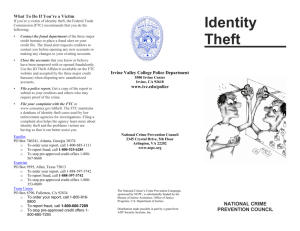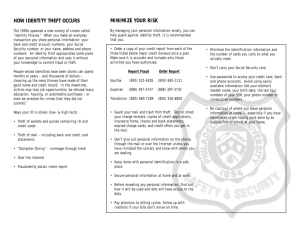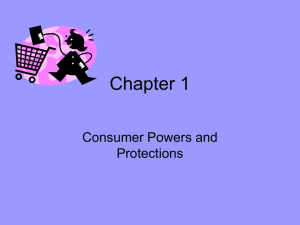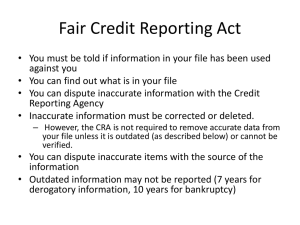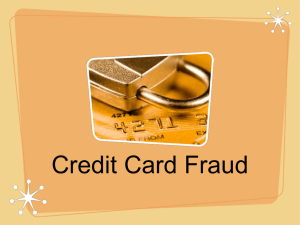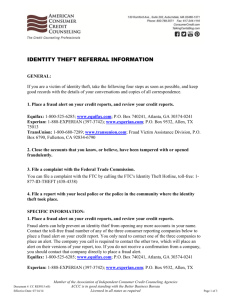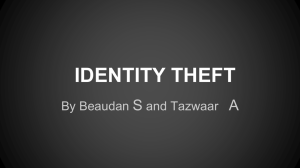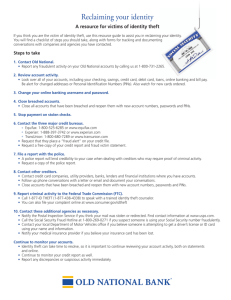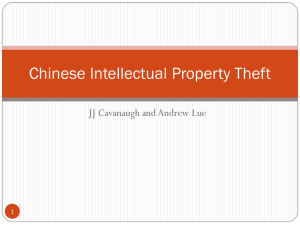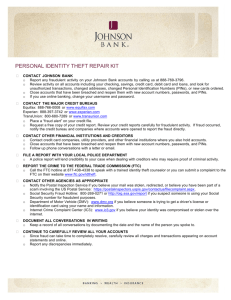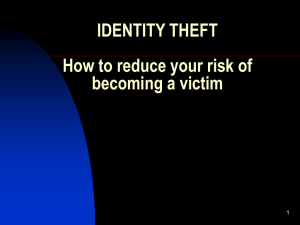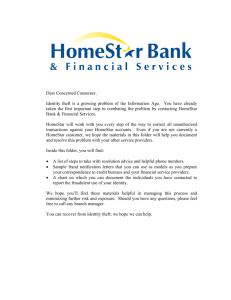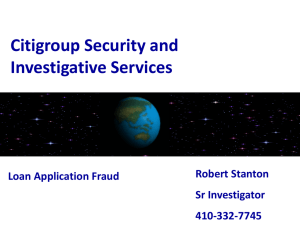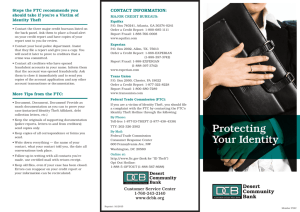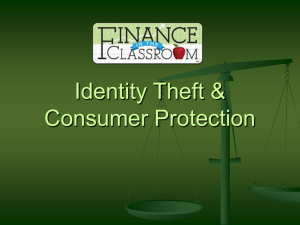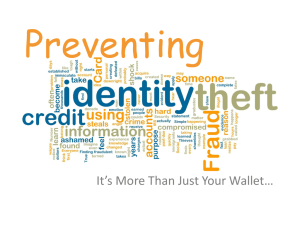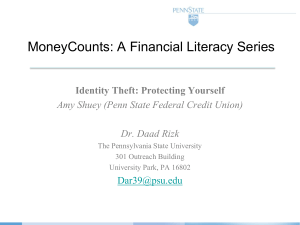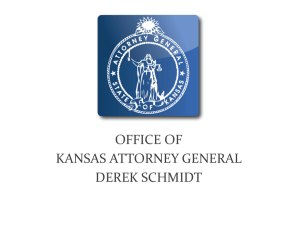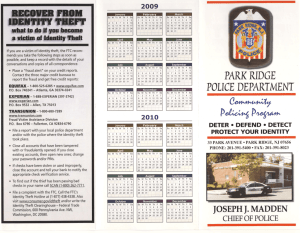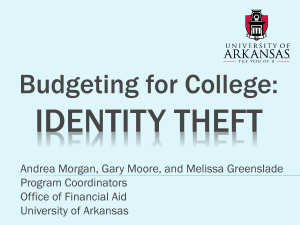Identity Theft & Fraud
advertisement
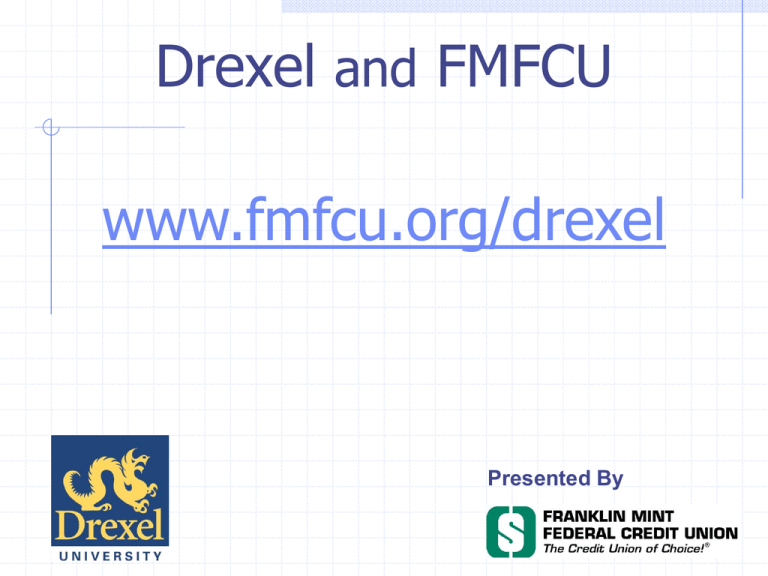
Drexel and FMFCU www.fmfcu.org/drexel Presented By Identity Theft & Fraud Presented By Identity Theft & Fraud Don’t Be The Next Victim! Presented By Identity Theft & Fraud What is Identity Theft? Presented By Leading Generation Targeted Federal Trade Commission data shows young adults, ages of 18 – 29, make up the largest percentage of identity theft victims. "Their youth and the open, communal atmosphere of college life can make college kids more susceptible to identity theft, studies show," says Jennifer Leuer, senior vice president of Experian "Many college students have little credit history, making them a preferred target for identity thieves." Presented By Who are the Victims? Presented By How Does It Happen? • • • • • • • Stolen wallets/purses/records Phishing Stolen or diverted mail (home or work) Dumpster diving Pose as business or landlord to CRA Internet hacking Buy from inside sources Presented By How Victim Information is Misused? • Use existing credit account until discovered • Empty bank account • Change address • Open new account in victim’s name at different location Presented By How Victim Information is Misused? • Take out loans (especially auto) for purchases • Establish phone or wireless account in victim’s name at different location • Sell the information Presented By Common Examples of Crimes Taking Place Today • Mail Fraud Scams • Family Members stealing information or debit cards • eBay/Craigslist Scams • Account take-overs • Selling information Presented By Consequences of ID Theft • Identity thieves NEVER pay bills for debts incurred under your name • You may not discover for months or years • You are then saddled with bad credit report • Due to bad credit report, you may be denied new credit, loans, mortgages, utility service, or employment Presented By Consequences of ID Theft • Were criminal records created in your name? • You may fail background checks for employment, insurance, etc. You may even spend time in jail! Presented By Tips to Reduce Risk and Prevent ID Theft • Review your credit report annually with all three major credit bureaus. TransUnion Experian Equifax • Question unknown accounts or inquiries Presented By Tips to Reduce Risk and Prevent ID Theft • Shred unnecessary financial documents Invoices Pre-approved credit offers Financial statements Anything with SSN Unused checks or credit cards Presented By Tips to Reduce Risk and Prevent ID Theft • Close unused or unneeded credit card or line of credit accounts. • Consolidate accounts as much as possible to make monitoring easier • Monitor incoming mail for regular bills and statements • If you notice expected financial statements are not reaching you, act immediately Presented By Tips to Reduce Risk and Prevent ID Theft • Retrieve and review mail regularly • Ensure mail is picked up or stopped when you are away • Deposit outgoing mail in official United States Postal Service Drop Boxes Only • Do not leave mail in unsecured boxes for pickup • Question suspicious incoming phone calls Presented By Tips to Reduce Risk and Prevent ID Theft • Secure and guard computers used to access financial information • Don’t write down or share passwords, PINS, etc. • Avoid use of common or easily guessed passwords Presented By Tips to Reduce Risk and Prevent ID Theft • Question suspicious email, online, or phone inquiries. • Unless you initiated the contact and are certain who you’re dealing with, don’t share personal identifiers or financial information. Presented By What Should Victims Do? • Report To Local Police Get a copy of the report (Be Persistent) • Contact Local Creditors Fraud Departments Report fraudulent accounts and charges Presented By Next Steps for Victims • Notify each credit reporting agency of all of the inaccuracies on your credit reports. • Notify each creditor in writing about any compromised accounts. • Get creditors to provide you something in writing stating they have closed the accounts and absolved you of the fraudulent debts. Presented By Credit Reporting Agencies EQUIFAX………………….1-800-525-6285 EXPERIAN………………..1-888-397-3742 TRANSUNION…………..1-800-680-7289 Presented By Other Contacts . . . • Postal Inspector If you suspect mail fraud. • Utility Companies Alert them to the possibility that someone may attempt to establish new services using your identification. • Department of Motor Vehicles If your drivers license has been compromised and/or used as identification on bad checks. Put a fraud alert on your license. Presented By If Checks are Stolen or Accounts Established Fraudulently ChexSystems Scan CheckRite CrossCheck EquiFax National Processing Co. TeleCheck International Check Services 1-800-428-9623 1-800-262-7771 1-800-766-2748 1-800-552-1900 1-800-437-5120 1-800-526-5380 1-800-710-9898 1-800-631-9656 Presented By Useful Resources Federal Trade Commission (FTC) You may get help from and file your case with the FTC Consumer Response Center. 1-877-IDTHEFT http://www.ftc.gov/idtheft/ Presented By More Useful Resources Privacy Rights Clearing House (PRC) Its website contains many publications on identity theft. 1-619-298-3396 http://www.privacyrights.org Identity Theft Survival Kit 1-800-725-0807 http://www.identitytheft.org Presented By Questions? More Information: www.fmfcu.org/drexel Presented By
